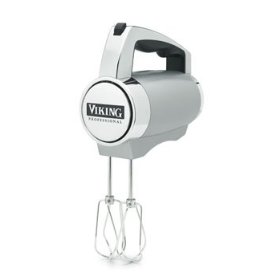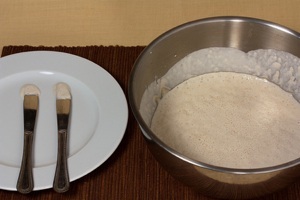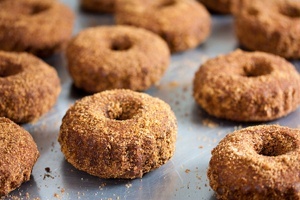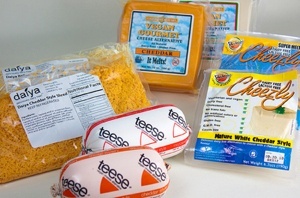Veganbaking.net
Vegan Baking Articles
Vegan Baking Guides
Building Your Vegan Kitchen, Part 2: Stocking Your Pantry
Building Your Vegan Kitchen, Part 2: Stocking Your Pantry
1
Comments (1)
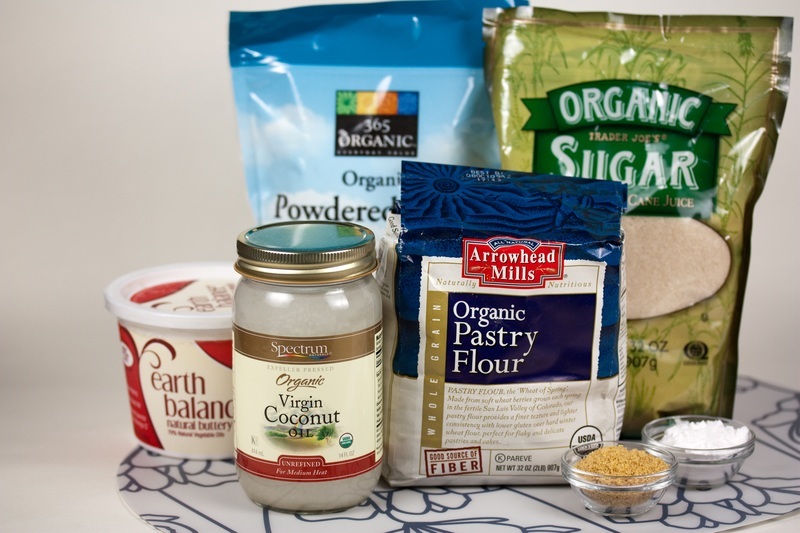
This is Part 2 of a 3 part series on how to get your kitchen dialed in for easy vegan baking. In Part 1 we talked about essential cookware that we recommend to make things nice and easy. In this article we'll detail ingredients that will make your vegan baking adventures easier so you're not running to the store trying to find that one ingredient you forgot about at 1am. Part 3 will detail specific tools that aren't necessities but are worthwhile additions to your vegan baking armory.
Now that you've got your basic cookware as described in Part 1 it's important to make sure you have vegan staple ingredients that will reduce panic when you're baking stuff from that latest cookbook you just purchased or if you're veganizing that Paula Dean recipe you saw recently (good luck with that). Please keep in mind that this guide assumes that your kitchen is already set up for non-vegan baking so basic items like cinnamon, vanilla extract and baking powder won't be covered.
In regular baking, you take certain avenues to get to your tasty destination by using certain avenues consisting of traditional ingredients like butter, eggs and sugar. In vegan baking, those destinations are the are still the same but the avenues are different. Yes, in vegan baking we're taking the scenic back route!
Sweeteners
Granulated White Sugar
Granulated white sugar is made both from sugar cane and sugar beets. Granulated white sugar derived from sugar cane undergoes a filtering process involving bone char from the animal industry. Sugar derived from beets does not involve this process. As of this writing, about 50% of white granulated sugar in the US is derived from beets and the other 50% is derived from sugar cane. Access to these sugars varies according to what part of the country and/or what sugar distribution channel you reside in. If you're interested in doing 100% vegan baking you should use granulated white sugar derived from beets. This sugar is often labeled as "Vegan Sugar' in health food stores. Another way to avoid this is to use turbinado sugar which doesn't go through the filtering process. Turbinado sugar is so close to granulated white sugar that it can be used in it's place in most cases, except in baked items where a light color is desired. Turbinado sugar's slightly darker color can darken these desserts unacceptably in these cases.I'm not convinced that the minuscule amounts of bone char used by the sugar industry generates enough money for the animal industry to actually benefit. I also don't believe that using turbinado sugar significantly results in less pollution to justify the significantly increased cost of that sugar. I also don't believe that alternative sugars are more healthy in any way. Sugars used in baking consist of different ratios of glucose to fructose molecules and one isn't necessarily less dentremental to health than the other. The trace minerals that alternative sugars contain are too negligible to make a difference to your health; you'd be much better off just not eating sugar at all if you're looking for health benefits. I use regular white granulated sugar because I choose to focus my efforts on more pressing food choice issues. What type of sugar you choose to use is up to you and it's up to everyone to respect each other's ideals.
Powdered Sugar
Powdered sugar, also known as confectioner's sugar is just granulated white sugar that's been ground up into tiny particles so the same issues apply to it as they to to granulated white sugar. Some cookbooks say you can make your own powdered sugar by putting regular sugar in a blender but we disagree. Perhaps this would work well if you had an extremely high powered blender such as a Vitamix. It's important to have readily available ingredients on hand with minimal preparation so we recommend having powdered sugar available at all times. You'll especially need it for things like frostings.Agave Syrup
Agave syrup is the darling of the sweetening family lately, being thoroughly covered in cookbooks like The BabyCakes Cookbook and heralded by raw chefs for years. Agave syrup is held in high regard due to it's low glycemic index. For more information on glycemic index and vegan sweeteners, check out our article here. Agave syrup is great for things like puddings, cakes and sweet breads, where you can substitute agave syrup for some or all of the sugar and/or liquid in your recipe. Since agave syrup is a liquid sweetener, make sure that you reduce your other water-based liquids in your recipe if you're substituting it for regular sugar. Also be prepared to partake in a couple of test cakes before you bring that newly veganized cake over to your cousin Jimmy's birthday party.Agave syup has a sweetness profile that's a little different than granulated sugar. It leaves a syrupy finish on the back of your tongue. Most people prefer the taste of regular sugar for baking due to it's neutral flavor but agave syrup is still a great thing to have in your vegan pantry. Also use it in place of corn syrup for caramel recipes and other recipes where you need to add just a touch of liquid sweetener like in Creamy Cashew Cream Cheese.
Brown Rice Syrup
Brown rice syrup is derived from making a mash of hot water and rice to convert the rice starches into sugar then cooking it down until it condenses into a dark rich syrup. It has a very caramel-butter-esque flavor that can be off putting in large amounts in most recipes. Usually this flavor is not noticed when 2 Tablespoons or less is used. This syrup extremely gooey, sticky and is great for adding a touch of binding power to sweet breads and cookies. If you want to make things that are chewy, brown rice syrup is a great addition to cookies, brownies or other bars.Fats
Non-Hydrogenated Margarine
The easiest way to veganize a recipe is to substitute non-hydrogenated margarine for the butter and call it a day. The industry standard for non-hydrogenated margarine at the time of this writing is Earth Balance. Earth balance is a proprietary blend of fats from certain vegetable oils that result in a margarine that does not need to go through the hydrogenation process.Hydrogenation is a process where hydrogen is passed through vegetable oil to make it solid at room temperature. Recent studies have shown that it also results in trans fats, resulting in some of the most toxic compounds in the food supply. Many health experts recommend a zero tolerance policy for hydrogenated oils for optimum health. Zero tolerance as in, never ever eat it under any circumstances. Earth balance is such a success because not only is their margarine non-hydrogenated, it's also damn tasty. Keep in mind that their tub margarine contains more water than butter and recipes that are veganized may have to be adjusted slightly to compensate. Earth Balance is also available in sticks that are firmer and closer to real butter in consistency but it's harder to find.
A disadvantage of non-hydrogenated margarines like Earth Balance is that they contain palm oil which is associated with rainforest destruction in palm oil producing countries like Sumatra. I've created a non-palm oil derived margarine called simply Vegan Butter to get around the palm oil issues and to empower vegan bakers with more control over the flavor profile of their recipes. I make Vegan Butter in large batches and store it in my freezer. The night before I bake I transfer it to my refrigerator or kitchen counter depending on the consistency my recipe calls for.
Canola Oil
Canola Oil is great for vegan baking in place of melted butter and in recipes where you're not interested in having a butter flavor or dense item. It's also significantly healthier than butter, margarine and most other fats for that matter due to it's good ratio of fats. Canola oil is high in mono-unsaturated fats, low in saturated fats and has a good ratio of omega-6 to omega-3 fatty acids. it's also great for high heat and has a very neutral flavor. Use it in place of cheap oils labeled "vegetable oil" which is just GMO soybean oil in most cases. Canola oil is great for sweet breads and cakes where you're not interested in creaming your margarine and sugar for leavening purposes.Shortening
If you've spent time making pie crusts and other flaky eats you might already know that butter, margarine and especially canola oil based pie crusts result in crusts with a low flake factor. I hate flakes as much as the next guy but when I want to get flaky I turn to shortening as do traditional bakers. I created a coconut oil-based, palm oil-free version of Vegan Shortening that works well as a drop in replacement for conventional shortenings. Often a mix of margarine and shortening is a good way to get a good flaky crust with a good buttery flavor. Companies like Spectrum andEarth Balance make outstanding vegan shortenings which are usually palm oil derived.
Coconut Oil
Coconut oil is great for many reasons. Like margarines and butters, it lends a great level of density to baked goods like brownies, cookies and other bars. It comes in two versions: Unrefined coconut oil is regular coconut oil and will make everything you bake taste like coconut. Refined coconut oil has the coconut flavor removed so you'll want to use this for situations where coconut flavor isn't desired.Like all fats that are solid at room temperature, coconut oil has a large amount of saturated fats. It used to be thought that all saturated fats were unhealthy. Recent studies have shown that the saturated fat in coconut oil is different on a molecular level. This version of saturated fats are known as medium chain fatty acids and haven't been shown to cause the same health issues as animal-based saturated fat. It's quite the contrary actually with coconut oil-based saturated fats being shown to be antiviral, antimicrobial and processed more efficiently by the body.
Egg Replacers
It's just not possible to recreate what an egg does. Vegan bakers have many different ways to get by with binding their eats which vary depending on the situation. Here is our list of vegan egg replacers. The most effective ones are listed below.Golden Flax Meal
Flax Seed Egg Replacer is currently my favorite egg replacer in non-light colored baked items like cakes, cookies and sweet breads. Be sure to use golden flax seeds as opposed to the darker ones and grind them in a powerful blender or spice grinder to yield a fine powder. This powder, when added to water yields a 'goop' that's similar to egg albumen. This is not to be used in puddings, sauces or frostings. It won't beat into a foam like an egg. Use in white cakes is also to be avoided because the flax particles will be visible.Flax meal is extremely perishable and will rapidly go rancid if left at room temperature for any longer than a few weeks. The seeds have a somewhat longer shelf life due to them having a strong outer shell. Do not buy pre ground flax meal because it's usually on it's way to being rancid very quickly if it isn't already. Buy it in seed form and store the seeds and the meal in the refrigerator. If the oils go rancid it becomes toxic and will make your baked goods taste like linseed oil which will result in lost vegan baking cool points.
Starch-Based Egg Replacers
These binders utilize vegetable starches like arrowroot, tapioca and guar gum which pull together into a goopy binding gel when exposed to heat. They also have a touch of baking powder to help in the leavening department because eggs have subtle leavening properties. The best starch based binder currently on the market is Ener-G Egg Replacer. We also have our version of starch based binder called Egg Replacer Powder. These sorts of binders work well for the same things that Flax Seed Egg Replacer is intended for. Starch-based egg replacers have the advantages of not discoloring light colored foods. They can also usually be used in higher quantities because they don't leave behind small particles.Other Stuff
Unsweetened Soy Milk, Rice Milk or Coconut Milk
Milk, soy milk, rice milk and recent addition to store shelves coconut milk work as great drop-in replacements for dairy-based milk. Just be sure to use unsweetened varieties whenever possible so you don't add additional hidden sugar to your recipe. Soy milk has a great creaminess that rice milk doesn't have so it's our first choice in vegan baking.Apple Cider Vinegar
When apple cider vinegar is added to soy milk in a ratio of about 1½ teaspoons of vinegar per 1 cup of soy milk, magical things happen. The soy milk curdles from the acids in the vinegar and it gets thicker and more flavorful. It also improves the crumb of your cakes, cookies and sweet breads which is very nice. We prefer the unfiltered version. Lemon juice works for this purpose as well.The Right Flours
in vegan baking as in non-vegan baking, it's imperative that you use the flours that are intended in the recipe you are following. All-purpose flour, whole wheat flour, bread flour, cake flour and pastry flour as well as non-gluten flours vary immensely. We recommend storing your flours in large glass containers with wide-mouth tops for ease of use. Taking off rubber bands and unfolding paper bags is just too much of a pain and makes a mess.We recommend having the following flours on hand if you don't have wheat allergies: All-purpose, whole wheat and bread flour. Be sure to store your whole wheat flour in the fridge so it's fats don't become rancid.
We recommend having the following flours on hand if you have allergies to gluten: Bob's Red Mill Gluten-Free All-Purpose Baking Flour, garbanzo/fava bean flour and brown rice flour.
With these above ingredients you'll be able to make most of the stuff you find on this website, on the web and with a little bit of luck and determination, be able to veganize almost any traditional baked eat.



